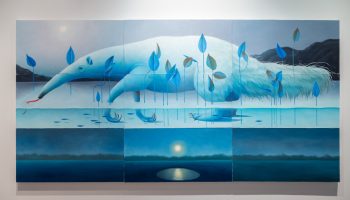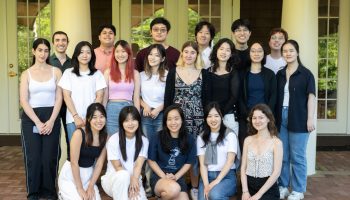To speak about xenophobia today, Mikael Eliasen is looking to the past.
“We live in times where the word ‘immigrant’ might be slightly controversial,” said Eliasen, a coach in the Chautauqua Voice Program. “I thought it would be a good idea to remind us all that we came from some kind of immigrant background.”
At 7:30 p.m. Wednesday in McKnight Hall, in a recital titled “Kurt Weill the Immigrant,” Eliasen and 11 voice students explore this topic through songs by two German immigrants whom history remembers differently.
Both Weill, the composer, and Bertolt Brecht, the poet and playwright, fled Nazi Germany in the 1930s. Weill was forced to leave because he was Jewish, and Brecht because he was outspoken against the Nazi regime.
Weill and Brecht continued to have flourishing careers in music in America. Even though Weill was a German immigrant, Eliasen said Weill is often remembered as a “big American broadway composer.” But while Weill is remembered fondly for his contribution to music, Brecht is remembered infamously. During the Red Scare, “witch hunt” of the Cold War, Brecht was again persecuted for being outspoken – this time by the United States. Brecht was blacklisted by movie studios and interrogated by the House Un-American Activities Committee in 1947.
“We’re going to celebrate that people came and made enormous contributions to our culture,” Eliasen said. “Sometimes we treated these people very badly and sometimes we celebrated them.”
Eliasen said Wednesday’s performance is not a protest concert; it’s what he calls an “enlightenment concert.” He said entertainment can take on many guises, and Wednesday it takes the form of education.
“This is not a concert for the audience to sit back and say, ‘Oh, isn’t this lovely,’ ” Eliasen said. “There’s not one word in the concert where you can say, ‘Oh, that’s lovely.’ ”
Eliasen sees art as a political voice. It’s a way for civil dialogue to take place between parties that disagree. He said the United States currently has a government that will cut the “dribble” of spending left on the arts. That is an issue “because it is through the arts we have made changes.” Eliasen said he was raised to speak up and to have an opinion. That’s the attitude he is encouraging in his students.
On Jan. 21, following President Donald Trump’s inauguration, Eliasen was heartened to see the various generations participating in the Women’s March — a protest he took part in, as well. He was moved to see grandparents marching with their children and grandchildren.
“Maybe an older generation will listen to a 20-year-old and not just say ‘Oh, they’re young they don’t know anything,’ ” Eliasen said. “That’s not true. They do know. They know a lot and they might even know more than their grandparents who should know better.”
Eliasen said the concert won’t change the world, the state, or even Chautauqua Institution, but he hopes the lesson resonates with someone.
“Let’s just all for a second remember where we came from,” Eliasen said. “Let’s not be so quick to condemn where people are coming from based on what religion they have. … Once you start with one, it’s dangerous. It just gets to be dangerous.”




